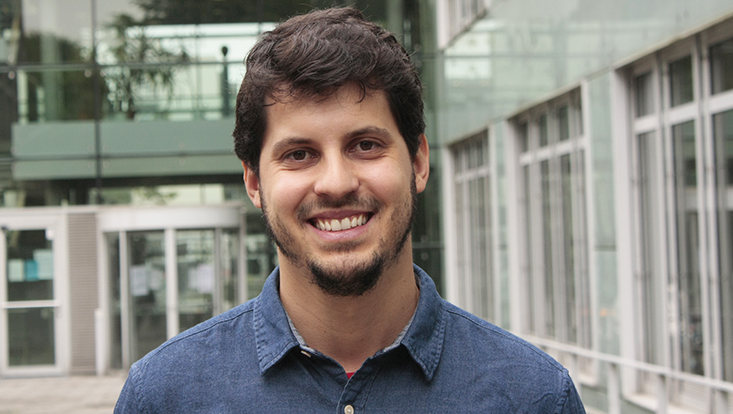Society Research
What are the major topics of your resesarch?
My research focuses on sustainable development governance, Brazilian studies, and climate futures.
I am interested in sustainable development governance and all its challenges and possibilities, from the theoretical, abstract discussion—for example, the question of what sustainability really is—to the implementation of sustainability and climate goals.
In my dissertation, I focused on the diffusion of the 2030 Agenda in Brazil: I asked how activists, scholars, and private sector actors—i.e., non-state actors—perceive the Agenda, what it means to them, and how they translate it into practice. I examined what normative and cognitive processes are at play and which practices and conflicts emerge from it. In a nutshell, I am interested in what sustainable development actually is and how sustainable development governance works.
In general, my research interests go beyond the Brazilian context, too. During my bachelor's degree, I studied politics and international relations while looking at the world from my Brazilian perspective. Now, I am looking at Brazil from a global perspective. I find this particularly exciting because Brazil has all the prerequisites to be a sustainable development power and a role model: in terms of renewable energies use, and given its dynamic economy, and its extremely interesting and diverse but, of course, contradictory society and history. In fact, Brazil has achieved a lot in the past, a good example being the decrease in its deforestation rate and improvements in social policies between 2003 and 2012.
Of course, the development at that time was not sustainable in every respect, and I seek to investigate the reasons behind this and highlight gaps that still need to be filled. At the same time, I do always try to keep Brazil's role in global sustainability governance in mind. If, for example, Brazil does not overcome the many setbacks of its current government soon and instead continues to destroy the Amazon rainforest, this will have severe consequences for the whole world.
I have been a postdoc in CLICCS since June 2020. In the synthesis project, I am part of a highly interdisciplinary and international team. The Cluster of Excellence investigates which climate futures are possible and which are plausible. The primary role of the synthesis group is to consolidate the various CLICCS projects and topics in the Hamburg Climate Futures Outlook. It is a great experience but also a challenge to work with scientists from different disciplinary and epistemological contexts. While everyone contributes their unique view on the research questions we jointly seek to answer, we always need to find common ground in the end. This is not always easy and holds potential for conflict, but we work hard to find solutions for fruitful collaboration every time. So far, it’s working out pretty well!
How do you get to work when you are not working from home due to the pandemic?
I love cycling! Before the pandemic, I used a combination of metro and bike. Recently, I even bought a new bike—before that, I always used to have junk bikes. Since the beginning of the pandemic, I have mostly been working at home, but when I am out and about, be it privately or on one of the rare trips to the office, I cycle! After the pandemic, I plan to go to the office exclusively by bike.
What do you consider a successful day?
I have many rituals, although not every day is a carbon copy of the one before, of course. I like to have a relaxed breakfast and read the news in the morning, then go to the office for a fruitful working day. Meeting people at work and afterwards is also very important to me. After work, I like to have time for my hobbies: playing music, football, reading a book or watching a series. A successful day is when I can combine good food with social contact and productive work. Unfortunately, this has become more difficult during the pandemic. But I try to overcome the adverse circumstances with yoga, walks in the forest and other forms of exercise.
How did you get interested in the topic of sustainability?
It may sound cliché, but I have been interested in social inequality since I was a child and became involved with development issues early on. For example, whenever my parents drove my brother and me to school, I couldn’t understand why children who looked just like me had to sell sweets at traffic lights while I sat comfortably in the car. As a child of a middle-class Brazilian family, I did experience tougher periods at times, but I never understood the extreme social inequalities in Brazil. This sparked my interest not only in politics but also in development issues and the reasons behind them. Over time, I realized the importance of sustainability in this context. My wife has also influenced me with her enthusiasm for sustainability issues. Since my PhD, I have been particularly concerned with the topic of sustainable development and sustainability as an ongoing process and a value in itself.
What research interest is not on your CV?
I would like explore the digital transformation in greater depth soon. I have already initiated a project within CLICCS on the topic of digitalization and climate action with some colleagues. Think of the potential of AI in the optimization of clean energy supplies, for example. What is particularly interesting to me is the link between digital transformations and sustainable development and what opportunities—and risks—this combination can hold.
What do you consider to be essential for a happy childhood?
Freedom, lightness, play, music, contact with nature, and living without fear all make up a happy childhood to me. I also think it is important to encounter different perspectives at an early age, for example, by coming into contact with people and cultures that are different to your own. A diverse city like Hamburg with its beautiful green spaces is a great place for all that.
What comes to mind when you hear the buzzword ‘zero-emission Hamburg’?
I must confess that I am a critical but, at the same time, quite optimistic person. Gramsci’s notion of ‘pessimism of intelligence, optimism of will’ is very inspiring to me in that sense. I don’t know if we will see an emission-free Hamburg, but I believe it is possible. If society and policymakers work together, supported by science, and focus on making it happen, then it will be possible. In practical terms, this requires a few things: strong social movements for climate protection and justice, sustainable and climate-friendly infrastructure, fewer cars and an increase in the ratio of electric vehicles, sustainable production through decarbonized industry, and sustainable consumption, for example.
I am optimistic about the young generation and everything they do around the world to make society more sustainable: think of movements like Fridays for Future, for instance. Of course, the structural problems and conditions for sustainable development are not the same in different countries and contexts, but I find it incredibly encouraging that there is global commitment to climate protection and sustainable development and that it is on the rise worldwide.
When did you stop thinking you were becoming more sustainable? Or do you still think so?
This is a difficult question, because it always has to be considered in terms of a comparison to others or an average. In some ways, I am probably more sustainable than other people, in other ways, less so. For example, my wife and I try to fly to Brazil once a year to visit our family, which is fairly harmful to the environment. On the other hand, we consume very little electricity, rarely buy anything new and use things as long as possible, and we always try to buy sustainable products (food, clothing, etc.) whenever we can.
For me, it’s not only about the environment—not just about plastic or being vegan—but also about social issues, such as gender equality and working conditions. From a holistic perspective, it makes no sense to care deeply about environmental issues but have no interest in social inequality and social justice.
I think that sustainability is like democracy. It is never a finished thing but a constant process of becoming. We will never be sustainable enough and we will never be democratic enough. That’s not necessarily a bad thing, either, because it means that we can always be better. There is no point in feeling guilty constantly, but I must ask myself what I can do, what my role is and what sustainable development and a sustainable society should look like.
Sustainability, then, is a value, a goal and a process in the making. This reminds me of the Portuguese saying: ‘O caminho se faz ao caminhar’: the path is created while we are on the way.



